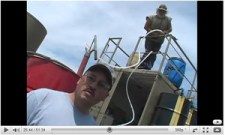After just over a week on YouTube, we are were already ranked 46th most viewed non-profit channel on the site! Help us promote our videos on YouTube!
- Watch and leave comments for each video
- Rate the videos you like
- Subscribe to Village Earths’ channel on YouTube and receive updates when new videos are added.
Below are some of the videos available.  “Por El Rio Tigre” is a community-based film workshop with Kichwa, Zapara, and Bora communities in the Rio Tigre region of Peru. The expedition took place over 5 weeks, November through December of 2006. The community-based film workshops, developed by Village Earth, allow entire communities to work together link past, present, and possible futures into a shared narrative with the express purpose of communicating with outsiders to raise awareness and support for their situation while attempting to mitigate the distortion or framing of issues by outsiders.
“Por El Rio Tigre” is a community-based film workshop with Kichwa, Zapara, and Bora communities in the Rio Tigre region of Peru. The expedition took place over 5 weeks, November through December of 2006. The community-based film workshops, developed by Village Earth, allow entire communities to work together link past, present, and possible futures into a shared narrative with the express purpose of communicating with outsiders to raise awareness and support for their situation while attempting to mitigate the distortion or framing of issues by outsiders.  “Children of the Anaconda” A community-based film production facilitated by reflexive films and Village Earth. Paromea Ronin Bakebo (Shipibo for “the Children of the Anaconda) illustrates the visions and hopes of the Shipibo people of Peru’s Amazon Basin, who struggle to protect their way of life and natural resources against the threats from outside interests encroaching upon their traditional lands.
“Children of the Anaconda” A community-based film production facilitated by reflexive films and Village Earth. Paromea Ronin Bakebo (Shipibo for “the Children of the Anaconda) illustrates the visions and hopes of the Shipibo people of Peru’s Amazon Basin, who struggle to protect their way of life and natural resources against the threats from outside interests encroaching upon their traditional lands.  “Rezonomics” A documentary on the eclectic and inventive survival strategies of residents of the Pine Ridge Reservation, navigates the seamless web of economic and social relations of the Oglala Lakota, challenging the Western European notion of economy, which separates the “rational” economic from the embedded moral, normative, and reciprocal relations at play in many indigenous and rural communities. This film has been produced by the Department of Anthropology of Colorado State University, Village Earth, and Reflexive Films. Filmmakers: Ralf Kracke-Berndorff, Raúl Paz Pastrana, David Bartecchi Festivals: DocsDF, Mexico City’s Documentary Film Festival, 2006 (docsdf.com); EthnoFilmFest, Völkerkundemuseum München, 2010
“Rezonomics” A documentary on the eclectic and inventive survival strategies of residents of the Pine Ridge Reservation, navigates the seamless web of economic and social relations of the Oglala Lakota, challenging the Western European notion of economy, which separates the “rational” economic from the embedded moral, normative, and reciprocal relations at play in many indigenous and rural communities. This film has been produced by the Department of Anthropology of Colorado State University, Village Earth, and Reflexive Films. Filmmakers: Ralf Kracke-Berndorff, Raúl Paz Pastrana, David Bartecchi Festivals: DocsDF, Mexico City’s Documentary Film Festival, 2006 (docsdf.com); EthnoFilmFest, Völkerkundemuseum München, 2010










